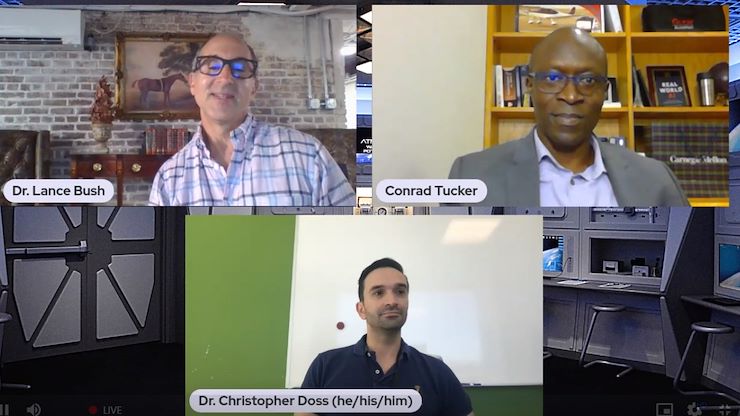
Dr. Lance Bush, President and CEO of Challenger Center, Dr. Conrad Tucker, an Arthur Hamerschlag Career Development Professor of Mechanical Engineering, and Dr. Christopher Doss, an Associate Policy Researcher and economist of education at the RAND Corporation discuss the impact of deepfake videos on education and the spread of misinformation during the 2021 Technology and Learning Conference. (Photo by Eric Devlin)
For the second year in a row, Montgomery County Community College became a central hub for educators and technological innovators from around the globe to meet virtually and exchange ideas, including the importance of combating the spread of misinformation online.
MCCC hosted its 27th annual Technology and Learning Conference Friday, Sept. 24, entirely online. The year’s conference featured more than 25 sessions ranging from pandemic learning to Augmented Reality/Virtual Reality and student leadership. Nearly 500 registrants from around the world were in attendance for this year’s conference including Australia, Bulgaria, Canada, China, India, Mexico, New Zealand, the Philippines, Singapore, Trinidad and Tobago, Uganda, the United Kingdom and the United States.
MCCC President Dr. Victoria L. Bastecki-Perez, shared “I am both proud and honored to be able to join and support a conference providing engaging opportunities for discussion and educational growth with the communities that the College serves. Fostering meaningful external relationships that provide growth to regional, national and international collaborations is a pillar of our strategic plan.”
“Last year’s conference was the first time MCCC presented the event entirely virtually. Hosting it in the new format, however, has allowed it to develop into a place to exchange information around the world,” said Dr. Celeste Schwartz, Vice President of Information Technology and Institutional Effectiveness.
“This has allowed us to reach beyond the tristate area,” she said, “and share a wealth of knowledge, as we explore topics that impact the landscape of technology in education.”
The event kicked off with the keynote panel presentation “Deepfake Videos and Impacts on Education.” A deepfake video is a manipulated video or other digital representation produced by sophisticated machine-learning techniques that yield seemingly realistic, but fabricated, images and sounds. Deepfake videos can, for instance, make it appear that people said or did something that they did not, according to the Associated Press.
The panel featured Dr. Lance Bush, President and CEO of Challenger Center. (The Challenger Center @ Montco Pottstown will soon open at the College’s Pottstown Campus and will be the first of its kind in Pennsylvania. It features space-themed simulated learning environments to engage students in dynamic, hands-on opportunities.) Also on the panel were Dr. Conrad Tucker, an Arthur Hamerschlag Career Development Professor of Mechanical Engineering, and Dr. Christopher Doss, an Associate Policy Researcher and economist of education at the RAND Corporation.
Bush, who began his career at NASA, explained when deepfake videos originated online, they were created for simple, harmless entertainment. Unfortunately, they’ve grown to become a powerful tool used to spread misinformation online.
“It’s safe to say that in 2021 most of us knowingly or unknowingly have been exposed to a deepfake video,” said Bush. “Maybe you saw President Obama’s public service announcement about deepfakes or the deepfake with Tom Cruise talking about the importance of handwashing.”
As deepfakes become more prolific, there is a growing concern over the risk of exposing students to potential misinformation, he said. He cited the 2020 presidential election and the pandemic as cases where deepfakes were used to spread misinformation. That’s why his organization became involved with a National Science Foundation study with Carnegie Mellon and RAND to explore who is susceptible to deepfakes and to think about strategies to reduce the risk of students believing the misinformation.
“Deepfakes and misinformation will impact us all,” said Tucker. “This is not just a university or research issue. This issue traverses demographics, populations (and) regions.”
As someone who studies the intersection of technology and education, Doss said deepfakes and the spread of misinformation are a growing problem.
“I think the events of the last year and a half underscore the problem of STEM-related (science, technology, engineering and math) misinformation,” said Doss. “A lot of information that has been disseminated has been more traditional forms of misinformation, such as conspiracy theories, outright lies and misrepresentations of science. I think we’ve seen that the effects have been overwhelming. Video has always been a more potent form of communication and the rapid democratization of deepfakes can been even more concerning."
Understanding the importance of the issue, Tucker said the goal is to find ways to protect those most vulnerable to believing misinformation. Much like the development of a vaccine and the usage of masks to help slow the spread of COVID-19, they are looking to identify multiple layers of protection and a “digital vaccine” against misinformation to mitigate its impact in the years to come.
The Technology and Learning Conference continued with several other presentations including a focus on improving learning skills using the CORI (Capture, Organize, Refine, Integrate) process by Glean; how Montgomery County Community College faculty and staff prepared for the fall 2021 semester by introducing hybrid and flex courses, which combine online and in-class study for students; and a look at the integration of technology in the classroom and its effects by Dr. Steven Baron, MCCC Psychology Associate Professor and his son, Michael Baron, Psychology Lecturer.
“Let me express my gratitude as well and appreciation to the IT team, who has worked tirelessly to bring this conference to fruition,” said Schwartz. “Especially conference co-chairs Jennifer Kim (Information Technology Manager) and Dr. Mary-Kate Najarian (Director of User Success and Learning Technologies).”
